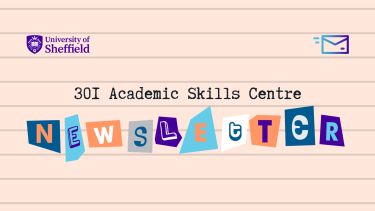Time management
Ideas and strategies to help manage your time and avoid distractions.

Managing your time
Time management is perhaps the single most important and challenging skill to develop as a student.
In an environment where nobody will tell you precisely what you should be doing and when, the art of planning, managing and meeting personal deadlines – both social and academic – must be mastered sooner rather than later.
Some people like to plan things early in fine detail so that everything is ready in plenty of time. Others positively thrive on the pressure of meeting a last-minute deadline.
Whichever kind of person you are, you will need to keep on top of a range of different tasks at the same time, so you will need to consciously manage your time one way or another.
301 Recommends:
Our workshop on Managing Your Time explores techniques you can use to manage your time, identify how you procrastinate, learn skills that will help you to prioritise your workload, and offer practical tips that you can apply to your academic work in order to become more productive. The Putting it into Practise Time Management workshop gives you the added opportunity to practically implement these skills.
Our Exam and Deadline Time Management workshop will consider tips and techniques to get to know your own habits (good and bad), manage your time productively, make plans and prioritise in busy periods of your studies, and keep procrastination at bay.
The importance of downtime
Time management is not just about fitting as much as you possibly can into your day. It is also about building good habits that are sustainable in the long term.
For a short period, we might be able to work ten to twelve hours a day, but this is not a sustainable way of working and runs the risk of burn-out.
There is plenty of evidence to suggest that working more than eight hours a day will decrease your efficiency and focus.
Building a steady and sustainable schedule will get you making progress every day without overworking yourself and it will help you stay happier and more focused.
Some people are morning people and some are night owls. Try to identify when you work most efficiently and try to work on your thinking heavy tasks around those times.
Try to build in one to two hours of free time every day into your schedule and take at least one day off every week.
Rest, relaxation, good-quality sleep and time for socialising and exercise will help to refresh your mind and body and help you to meet the challenges of your course.
Some key principles are as follows:
Top and tail
Identify a start time and end time for your working day. When you reach your end time, try to switch off and get away from your studies until the next day.
Make space
Find a study space that works for you and allows you to have an appropriate work-life balance. That may be as simple as creating a desk that is your workstation in your room or finding a space that works for you around the campus.
Reward yourself
Make plans for evenings and weekends that you can use as an incentive to get your work done in good time.
Be realistic
Recognise that you won't finish everything that you set out to do every day or week. Use a to-do list to make sure that the higher-priority tasks are completed first and roll over the tasks that are less urgent.
Remember getting through your course is a marathon, not a sprint.
Planning your time
The first step towards building good habits is understanding your workload. It is a good idea at the beginning of term to map out all your deadlines and other important milestones.
You can do this using a year planner or calendar. There are some useful templates for this on Calendarpedia.
It's a good idea to plan your standard week based on your contact hours (lectures, seminars, tutorials, labs, etc) and the amount of independent study you are expected to do.
This might include prep time for your lectures, seminars and lab work, reading, exercises and reports, as well as all of your end-of-term assignments and exam revision.
As a rule of thumb, a full-time university course roughly equates to a normal working week, ie 35 hours.
Planning out your weekly tasks on a single sheet will give you a more realistic idea of the amount of work you'll have to complete and where you might have gaps available.
- Try out the 301 Weekly planner template (PDF, 399KB) to plan your 'standard' week.
Finally, you'll need to keep track of all your tasks. A good idea might be to create a to-do list for each module, adding to it everything that you need to do and identifying which are the high-priority tasks and which are lower priority.
- Try using the 301 Urgent-Important matrix (PDF, 386KB) to decide on the priority of tasks.
Once you have this in place, you can take great satisfaction in working through those tasks and crossing them off.
301 Recommends:
Our Beating Procrastination workshop will look at some of the causes, some strategies that can be put in place to keep procrastination at bay, and why procrastination might not always be such a bad thing!
Take a look at this Google Calendar training by LinkedIn Learning. Google Calendar is available to all students via MUSE My services. It's a great way to manage your time and remind yourself of important appointments and tasks.
Beating procrastination
Procrastination, or putting off tasks which need to be done, is a major challenge of time management that can have a major impact on our levels of stress and anxiety.
Rather than simple time-wasting or laziness, procrastination is a genuine psychological response to workload demands and it's particularly common at university.
Defined as a form of voluntary, irrational delay that has negative consequences on the procrastinating individual, procrastination is a habitual form of postponing action to a later date.
If you find yourself struggling with procrastination, don't panic. Studies suggest that at least 70% of university students procrastinate regularly during their time at university. Procrastinating is a habit but, like all habits, it can be broken.
Try the following steps:
-
Spend some time reflecting on when and how you procrastinate. Be honest with yourself and see if you can pinpoint triggers for procrastination.
-
Break large tasks into smaller, more manageable chunks. Try and ease yourself in with easier parts of the essay writing process, for example, rather than starting with something too difficult or ambitious.
-
Structure your time around deadlines and revise this regularly as new tasks are added to your to-do list. Prioritise urgent and important tasks and keep a checklist to track your progress.
-
Build positive habits by embedding behaviours over time, for example starting work at a particular time or identifying a daily study target. Try taking on the 301 21-day anti-procrastination challenge (PDF, 368KB) to put this into practice.
301 Recommends: Eat the frog
"Eat a live frog first thing in the morning and nothing worse will happen to you the rest of the day"
Nicholas Chamfort
Causeries Du Lundi, 1851
Often, there is a single, awkward task that gets in the way of all others: email your tutor, meet your supervisor, compile your bibliography, read a difficult article.
That task is your frog. Try dispatching it first thing in the morning and the rest of the day will seem much easier.
Top tips and further resources
Find a study space that works for you. Check out the available library learning spaces at the University.
Prioritise relaxation and high quality sleep as well as your academic workload.
Visit the 301 independent study pages for more ideas on organising your study time.
Access the additional help and support you need sooner rather than later. Visit the University wellbeing pages for more information.
Academic Skills Certificate
The 301 Academic Skills Certificate gives you recognition for your skills development.
It provides an opportunity for you to gain recognition for developing your skills and reflecting on this experience.
Through this reflection, you will be able to identify changes and improvements to your academic skills that will lead to long-term benefits to your studies.
The 301 Academic Skills Certificate acknowledges your commitment to enhancing your academic and employability skills and personal development.

Be the first to hear about our new and upcoming workshops!
The 301 Academic Skills Centre newsletter is a fortnightly email for study skills, mathematics and statistics.
Be the first to find out about our:
- new and upcoming workshops,
- special events and programmes, and
- new and relevant online materials and resources.
